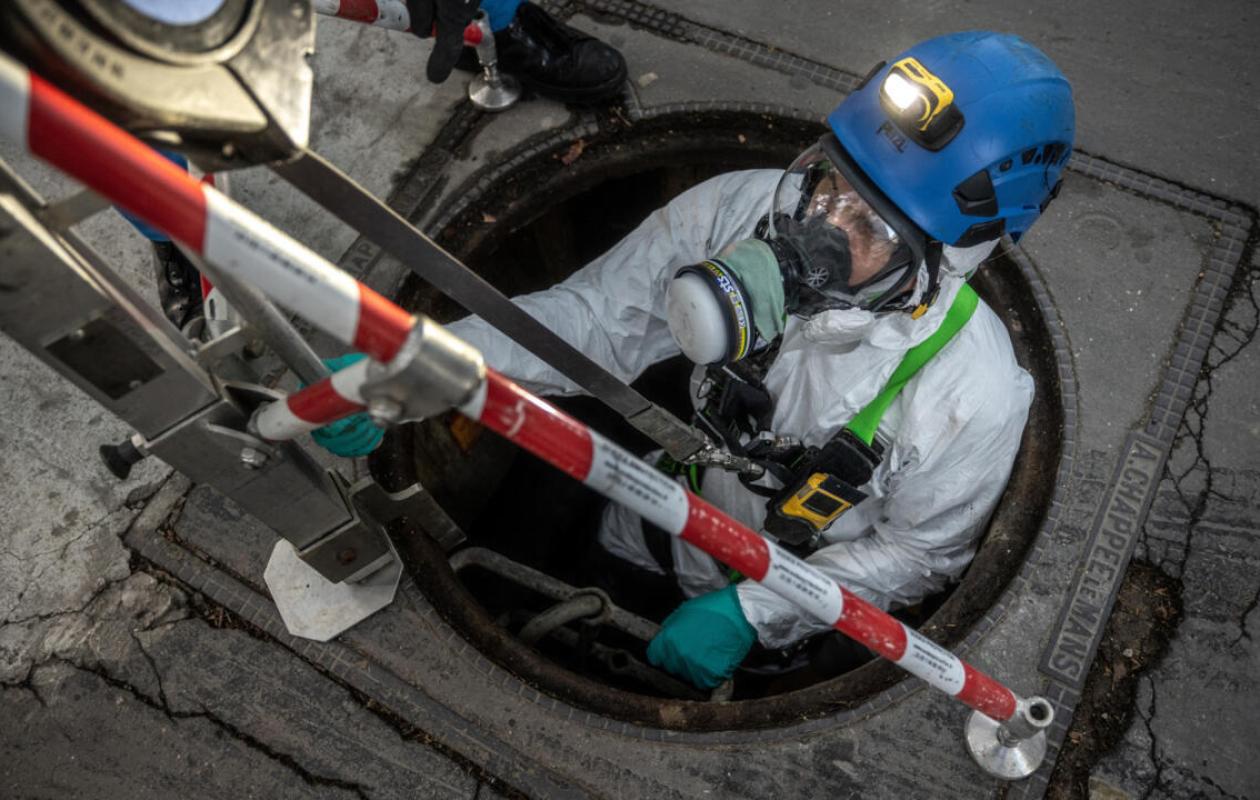
France: les égoutiers de Paris, travailleurs "de l'ombre" essentiels à la ville lumière
The manhole opens and Roland Bourgade, 59, plunges several meters beneath the city of Paris, protected from head to toe, in a well-practiced choreography where safety rhymes with teamwork.
Every weekday, the French capital's sewer workers scour the approximately 2,600 kilometers of tunnel to clean, maintain, and repair this sewerage channel developed during the time of Baron Haussmann in the 19th century. This network is essential for evacuating wastewater and rainwater, preventing the spread of disease and unpleasant odors.
This October morning, four men put on white jumpsuits, green boots, gloves, a blue helmet, and a ventilated mask at the foot of a building under construction.
"I have a gas detector that detects any toxic gas in the sewer," explains Donatien Lacoste, 45, who claims to have seen improvements in the equipment over time. Fifteen years ago, this former "ripeur" - a garbage collector behind a garbage truck - became a sewer worker, in part to discover "a mysterious place" that "no one knows about."
The organization is meticulous: a sewer worker stays on the surface and hooks the harnesses of those descending the ladder. "Safety is paramount," recalls the unit's head, Roland Bourgade, who has "learned to love this job," with visible "results."
When "we ask customers a week later 'are these smells still there?' they are generally satisfied with the work we do," says this former accountant, who has been a sewer worker for 14 years.
Today's mission: take underground measurements in preparation for construction work.
Arriving at the bottom, Roland Bourgade first noticed "a lot of water on the benches", the sidewalks of the sewers.
After assessment, four men descend while two others, the "orifice guards", remain on the surface.
Underground, headlamps illuminate a cramped space where murky water reaches some 50 centimeters deep. On the walls, large pipes for potable and non-potable water run alongside fiber optic cables.
"We're at number 72 here, it's indicated by a plaque," explains Donatien Lacoste, pointing to a hole where all the building's "wastewater" ends up. Another takes measurements with a meter.
The underground expedition lasts about an hour.
"It's a pretty cool day," admits Donatien Lacoste. "Normally, we go down for between 3 and 4 hours."
"It's a very dangerous environment, so you always have to be a little apprehensive," he warns, mentioning numerous "risks" such as "slips," "shocks" and gas poisoning.
"Every two years, we are vaccinated against leptospirosis," he continues, a disease transmitted mainly by rats.
The sewer workers see everything as cockroaches. In 1984, a young crocodile was discovered, "out for a walk," according to an AFP report from the time. An unusual story that is passed down in the industry.
The qualities required for this job? "Not being claustrophobic," "being in great shape," Roland Bourgade lists, also referring to a "corporation where you have to be close-knit."
"We work in a confined space, with a difficult job, so it has a big impact on morale. That's why it's important to have colleagues with whom the atmosphere is good," adds Abdoul, 45, who has been a sewer worker for six years.
A hardship which generally allows them to claim their right to retirement ten years earlier than the rest of the population.
Among the 260 "sewer workers of Paname" and chief sewer workers, there are only 13 women. A "historic imbalance," points out Antoine Guillou, deputy mayor of Paris in charge of cleanliness, who "hopes that this will change."
The elected official praises a profession that is essential for "preserving the health of Parisians" and the environment, such as the decontamination of the Seine.
"Without us, the smells would rise, the sewers would be blocked, so everything would come back to the surface," confirms Donatien Lacoste.
Babacar Sarr, 32, a sewer worker for almost six years, speaks of a "shadow job" that is not "enough highlighted" even though it "contributes" to the well-being of the city.
The city whose sewer is "the conscience," wrote the French writer Victor Hugo.
Commentaires (2)
Participer à la Discussion
Règles de la communauté :
💡 Astuce : Utilisez des emojis depuis votre téléphone ou le module emoji ci-dessous. Cliquez sur GIF pour ajouter un GIF animé. Collez un lien X/Twitter, TikTok ou Instagram pour l'afficher automatiquement.